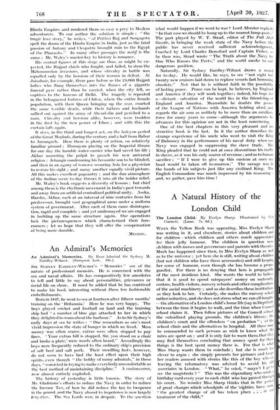An Admiral's Memories
An Admiral's Memories. By Rear-Admiral Sir Sydney M.
Sin SYDNEY EARDLEY-WILMOVE " Memories " are of the nature of professional memoirs. He is concerned with the sea and naval affairs. He has comparatively few anecdotes to tell and little to say about personalities, grievances or sOcial life on shore. It must be added that he has contrived to make his book interesting without these too fashionable embellishments.
Born in 1847, he went to sea at fourteen after fifteen months' training on the Britannia.' here he was very happy. The boys played cricket and football on land and the training ship had " a number of blue gigs attached to her in which they delighted to mans about the harbour." As to Sir Sydney's early days at sea he writes : " One remembers as one's most Vivid impression the state of hunger in which we lived. Mess money was often scarce, extras were often • stopped to pay fines. Your extras bill is stopped, Sir, you stood on a chair and broke a plate,' were words often heard." Accordingly the boys were frequently reduced to the ordinary ship's provision of salt beef and salt pork. Their unwilling fasts, however, do not seem to have had the least effect upon their high spirits, even though " the hobby of many admirals," in those days, consisted in trying to make everybody uncomfortable as the best method of maintaining discipline." A euriouserror; now almost entirely exploded.
The history of yesterday is little known. The story of Mr. Gladstone's efforts to reduce the Navy in order to reduce the Income Tax, of how. he did reduce the tax to twopence in the pound, and the Navy almost to impotence is now largely forgotten. The Sea Lords were in despair. To the question what would happen if we went to war ? Lord Meeter replied: "In that ease we should be hung up to the nearest lamp-posts." The part played by W. T. Stead, editor of The Pall Moll Gazette, in bringing- the weak state of the Navy .before the public has never received sufficient acknowledgment. Coached by Lord Charles Beresford and Captain Fisher, as he then was, Stead wrote ". The Truth about the ,Navy by One Who Knows the Filets," and the World awoke to our dangerous position.
Naturally, Sir Sydney Eardley-Wilniot draws . a moral for to-day. He would like,- he says, to see "'not eight buf twenty new cruisers laid down to replace vessels fast becoming obsolete." Not that he is without faith in the possibility of lasting peace. Peace can be kept, he- believes, by England and America if they will work together ; indeed, his hope for a—distant—salvation of the world lies in the friendship of England and America. Meanwhile he doubts the power of the League of Nations with America holding aloof, and regards the air arm as unlikely to be more than an auxiliary force for many years to come—although the arguments he advances for this opinion' are not in the least convincing.
One of the best chapters in this very pleasant and in- structive book is the last. In it the author describes the strange experience of his uncle who went to visit the King of Dahomey in the performance of his naval duty when oar, Navy was engaged in suppressing the slave trade. The King pleaded that be could not at once discontinue his trail)e in slaves, as it was his only source of revenue ; and as to human sacrifice : " If I were to give up this custom at once my. head would be taken off to-morrow." The savage was in the hands of his subjects just like any civilized King. The English Commodore was much impressed by his reasoning -- and, we gather, gave bins time










































 Previous page
Previous page